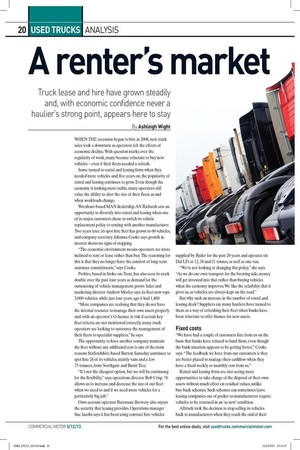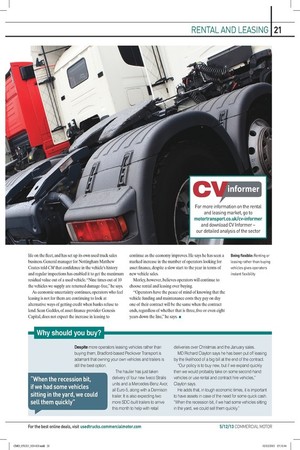A renter's market
Page 13

Page 14

If you've noticed an error in this article please click here to report it so we can fix it.
Truck lease and hire have grown steadily and, with economic confidence never a haulier's strong point, appears here to stay By Ashleigh Wight
WHEN THE recession began to bite in 2008, new truck sales took a downturn as operators felt the effects of economic decline. With question marks over the regularity of work, many became reluctant to buy new vehicles — even if their fleets needed a refresh.
Some turned to rental and leasing firms when they needed more vehicles and, five years on, the popularity of rental and leasing continues to grow. Even though the economy is looking more stable, many operators still value the ability to alter the size of their fleets as and when workloads change.
Wrexham-based MAN dealership AN Richards saw an opportunity to diversify into rental and leasing when one of its major customers chose to switch its vehicle replacement policy to renting with another manufacturer. Two years later, its spot hire fleet has grown to 60 vehicles, and company secretary Johanna Cooke says growth in interest shows no signs of stopping.
"The economic environment means operators are more inclined to rent or lease rather than buy. The reasoning for this is that they no longer have the comfort of long-term customer commitments," says Cooke.
Prohire, based in Stoke-on-Trent, has also seen its stock double over the past four years as demand for the outsourcing of vehicle management grows. Sales and marketing director Andrew Morley says its fleet now tops 3,000 vehicles, while just four years ago it had 1,400.
"More companies are realising that they do not have the internal resource to manage their own assets properly and, with an operator's 0-licence at risk if certain key fleet criteria are not monitored correctly, many truck operators are looking to outsource the management of their fleets to specialist suppliers," he says.
The opportunity to have another company maintain the fleet without any additional cost is one of the main reasons Staffordshire-based Burton Sameday continues to spot hire 26 of its vehicles, mainly vans and a few 7.5-tonners, from Northgate and Burnt Tree.
"It's not the cheapest option, but we will be continuing for the flexibility," says operations director Rob Crisp. "It allows us to increase and decrease the size of our fleet when we need to and if we need more vehicles for a particularly big job." Own-account operator Batemans Brewery also enjoys the security that leasing provides. Operations manager Sue Jacobs says it has been using contract hire vehicles
supplied by Ryder for the past 20 years and operates six Daf LFs at 12,18 and 21 tonnes, as well as one van.
"We're not looking at changing this policy," she says. "As we do our own transport for the brewing side, money will get invested into that rather than buying vehicles when the economy improves. We like the reliability that it gives us, as vehicles are always kept on the road."
But why such an increase in the number of rental and leasing deals? Suppliers say many hauliers have turned to them as a way of refreshing their fleet when banks have been reluctant to offer finance for new assets. Fixed costs
"We have had a couple of customers hire from us on the basis that banks have refused to fund them, even though the bank situation appears to be getting better," Cooke says. "The feedback we have from our customers is they are better placed to manage their cashflow when they have a fixed weekly or monthly cost from us."
Rental and leasing firms are also seeing more opportunities to take charge of the disposal of their own assets without much effect on residual values, unlike buy-back schemes. Such schemes can sometimes leave leasing companies out of pocket as manufacturers require vehicles to be returned in an 'as new' condition. Alltruck took the decision to stop selling its vehicles back to manufacturers when they reach the end of their
life on the fleet, and has set up its own used truck sales business. General manager for Nottingham Matthew Coates told CM that confidence in the vehicle's history and regular inspections has enabled it to get the maximum residual value out of a used vehicle. "Nine times out of 10 the vehicles we supply are returned damage-free," he says. As economic uncertainty continues, operators who feel leasing is not for them are continuing to look at alternative ways of getting credit when banks refuse to lend. Sean Geddes, of asset finance provider Genesis Capital, does not expect the increase in leasing to
continue as the economy improves. He says he has seen a marked increase in the number of operators looking for asset finance, despite a slow start to the year in terms of new vehicle sales.
Morley, however, believes operators will continue to choose rental and leasing over buying. "Operators have the peace of mind of knowing that the vehicle funding and maintenance costs they pay on day one of their contract will be the same when the contract ends, regardless of whether that is three, five or even eight years down the line," he says. •




































